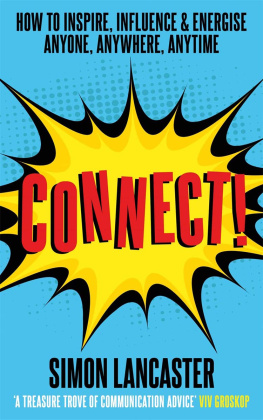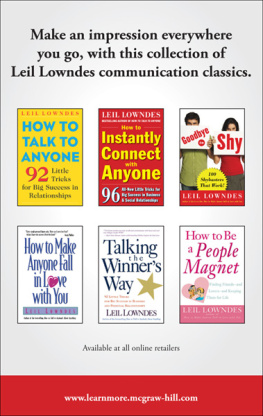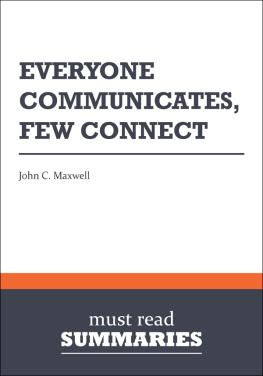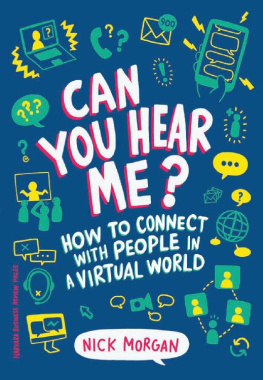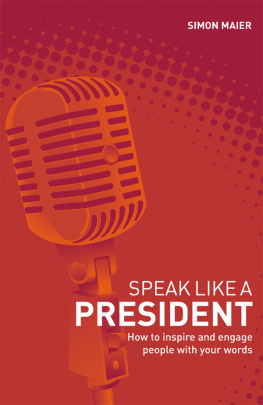
Praise for Connect!
Like everything the incredible Simon Lancaster does whether its in speech-writing, books or music this is erudite, interesting and, above all, entertaining.
Alan Johnson, author and former Home Secretary of the United Kingdom
In a world filled with division and anxiety, Simon Lancaster unlocks a treasure trove of advice on how we achieve meaningful and lasting connections with others through our written and spoken communications. And he makes it all sound fun and easy which is exactly how it should be.
Viv Groskop, author of How to Own the Room: Women and the Art of Brilliant Speaking
One of the worlds best speechwriters unveils the arts of persuasion with the help of some brain science. A racy, engrossing read.
Professor Ian Robertson, author of How Confidence Works: the new science of self-belief
A rollicking read, jammed full of inspiring insights and examples, showing how we can all use humour and playfulness to become better communicators. Great fun!
Neil Mullarkey, comedian and author of Seven Steps to Improve Your People Skills
In this highly entertaining guide to communication, Simon Lancaster provides rich insight into how to instantly connect with audiences. His anecdotes and familiar cultural reference points ensure that he always practises what he preaches, and so his ideas connect with readers.
Jonathan Charteris-Black, Emeritus Professor of Linguistics, University of the West of England.
Simon Lancaster dives into the language that dominates public debate to argue that the opinions many of us assume to be instinctive are actually the product of others manipulating words and phrases to provoke the reaction they desire. A thoroughly entertaining and highly relevant read.
Sir Peter Wanless, Chief Executive, NSPCC

Simon Lancaster runs Bespoke Speechwriting Services Ltd, a global speechwriting agency.

First published in the UK by Heligo Books
an imprint of Bonnier Books UK
4th Floor, Victoria House
Bloomsbury Square
London, WC1B 4DA
England
Owned by Bonnier Books
Sveavgen 56, Stockholm, Sweden
facebook.com/bonnierbooksuk/
twitter.com/bonnierbooks_uk
Trade paperback 978-1-78870-643-8
Ebook 978-1-78870-644-5
Audio 978-1-78870-642-1
All rights reserved. No part of the publication may be reproduced, stored in a retrieval system, transmitted or circulated in any form or by any means, electronic, mechanical, photocopying, recording or otherwise, without prior permission in writing of the publisher.
A CIP catalogue of this book is available from the British Library.
Cover and prelims designed by [Sophie McDonnell]
Typeset by IDSUK (Data Connection) Ltd
1 3 5 7 9 10 8 6 4 2
Copyright 2022 by Simon Lancaster
Simon Lancaster has asserted his moral right to be identified as the author of this Work in accordance with the Copyright, Designs and Patents Act 1988.
Every reasonable effort has been made to trace copyright holders of material reproduced in this book, but if any have been inadvertently overlooked the publishers would be glad to hear from them.
Heligo Books is an imprint of Bonnier Books UK
www.bonnierbooks.co.uk
To my brother Brendon, for always inspiring, influencing and energising me
Contents
Its the evening of Wednesday 9 March 2016 and Im leading 30 speechwriters from around the world down the steps into The Comedy Store Theatre in Leicester Square, London. Among us are speechwriters to Fortune 500 CEOs, prime ministers, monarchs, celebrities and billionaire philanthropists. As we push open the double doors to the theatre, we can instantly feel the buzz of energy that crackles through these places in the moments before showtime.
Ive always loved comedy clubs. I think its the prospect of the completely unknown: you never know whats going to happen or where things will go. This is especially true when The Comedy Store Players are performing. They are the in-house improvisation group who have performed on this stage since the early 1980s, and many of the original troupe are performing tonight Neil Mullarkey, Josie Lawrence, Andy Smart, Richard Vranch. Their act is based around taking random suggestions from the audience and somehow connecting them all together to create a show. As youd expect, the audience deliberately throws them the most incongruent ideas in the hope of seeing them flummoxed, but invariably they take whatever theyre given and turn it all into something smart, funny and totally unique. Its not every day you see a Shakespearean tragedy about a prostitute and a prime minister under attack from a flying panda with nothing to protect them but a pepperoni pizza.
The Comedy Store Players may be exceptionally good at it, but this ability to take random pieces of information and rapidly make connections is an essential skill for life. Every day, we are constantly bombarded with new people, new places and new pieces of information. The only way we can ever make sense of it all is by making quick connections. This person is like that person. This situation is like that situation. This book is like that other brilliant book I should buy it right now. Fortunately, most of the time we make these connections instinctively and, by and large, we do so very effectively.
Imagine youre in your office at the coffee point and you meet a new starter. Lets call her Sarah. What do you do? You look at her face, take a quick mental snapshot and then quickly compare that image against all the other faces you have known in your life, people you knew at school and university, people you worked with in previous jobs, people you liked, people you didnt like ... until BOOM! Youve found a connection.
Ah, Sarahs like Fiona! Well, Fionas great! Ive been out on the town with Fiona dozens of times over the last few years. Fionas fun, positive and super loyal. Instantly, your brain sparks up at the possibility that Sarah might be as good a friend as Fiona. From then on, the connection between Sarah and Fiona grows in your mind. Before long, youll start thinking of the two together, and may find it hard to think of one without thinking of the other. Eventually, you may even feel compelled to mention the connection: OMG! Sarahs just like my friend Fiona. And, if the connection between them gets really strong, you might even start to insist, Sarah. You must meet my friend Fiona!
Connections like these help us quickly comprehend and categorise new people we meet. According to Princeton psychologists Janine Willis and Alexander Todorov, we decide in a tenth of a second if we trust someone or not a blink of an eye and these first impressions are very much guided by similarities to people weve known or met before family, friends, even people with whom weve only had the most fleeting contact. If someone looks like someone who made us feel warm, well assume theyll also make us feel warm. If someone looks like someone who gave us the creeps, well assume that theyre a bit creepy too.
We think through connections
Our brain works through connections like these and they can frequently be very helpful, sparing us the bother of more rigorous analysis or the discomfort of ambiguity, providing quick and simple signals to how we should act. And these connections dont just shape how we act when we meet people, they determine how we respond in a wide variety of situations.
Next page
